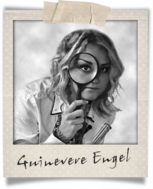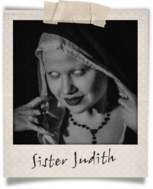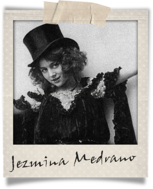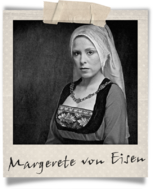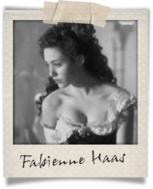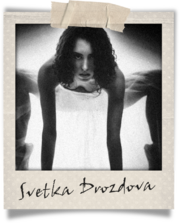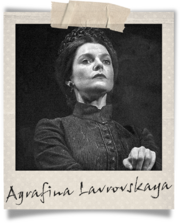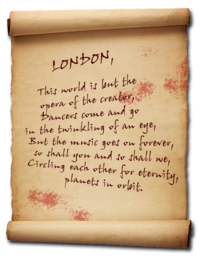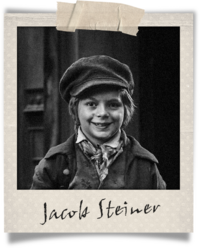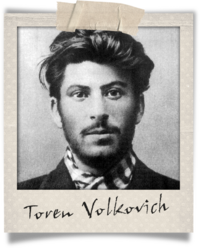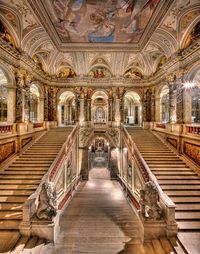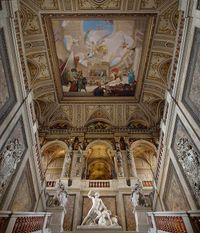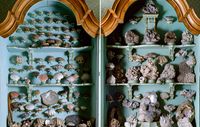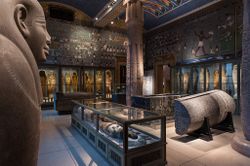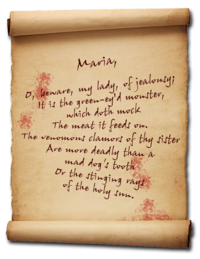2022-06-27
INVOLVED PARTIES
INCIDENT REPORT
Rumor Has It:
Night falls across Vienna and the coterie starts away in their respective havens. This evening, Jezmina Medrano has climbed up out of the communal pit beneath the stage of the Birdcage Theater to find that her sister-of-sorts, Svetka, has peach blossoms woven into her hair, a manner in which she has never previously styled herself. Passing her snide sister in the dressing room, Jezmina goes to her Sire, Agrafina’s office to ask her about the goings on of late. She tells her that she’s been having problems with a stalker, and that the peach blossoms in Svetka’s hair might suggest that she is a target as well. Agrafina reminds her that someone trying to hurt either of them would be a fool indeed, as her daughters are as deadly as they are beautiful. She also tells Jezmina that the rivalry between herself and her sister is intentional, there is no better way to press them both towards greatness.
Upon confronting Svetka about the flowers, she learns that one of the staff was bringing them backstage and she took them, because who else could they be for? Besides, the poem was called London, and Jezmina was not even with the ballet when they performed in London. Jezmina warns her about the stalker, but Svetka is dismissive, implying that Jezmina simply does not know what devoted fan attention is like, since she is not worthy of the adoration like Svetka herself is.
The stolen poem reads:
London
This world is but the opera of the creator,
Dancers come and go in the twinkling of an eye,
But the music goes on forever, so shall you and so shall we,
Circling each other for eternity, planets in orbit.
Across town on the campus of the Medical College at the University of Vienna, Doctor Engel wakes up to find that a note has been slid under her office door, it is simply labeled “Engel,” the German word for angel. It is sealed with silver wax embossed with a wolf’s head seal, upon opening it, Guinevere discovers that it is indeed from her Gangrel admirer, Professor Toren Volkovich. He is letting her know that he has gone to charter a carriage for their date to the Wonder Cabinet this evening and will pick her up at midnight from At the Skull.
Upon waking in the royal apartments, Margerete finds Gruber waiting for her, as expected. This night he informs her that he has been contacted by Victoria Roth’s man of business to extend a formal invitation to meet her at Count von Richter’s estate, The Golden Messenger, at her earliest convenience. As she heads out for the evening, she comes upon a bit of a ruckus, and she finds Duke Peter von Eisenhoff, her political rival, huffing away from a man she’s seen at court, but never met before. Duke Peter is cursing the petulant man for insulting him and says that if he were of a rank worthy of being noticed by him, he would call him out. But alas, only gentlemen of the same rank typically duel, and stooping to his level would damage Peter’s standing at court.
Margerete further insults Peter and he leaves in a huff, giving her a chance to speak to the mysterious young man who was so offensive to the Duke. She discovers that his name is Rudolf Belinsky, a minor Russian noble who has been sent to the Vienna court as a liaison. He admits that he finds Vienna tiresome, but at least things are happening, and it is not as cold and desolate as his native Russia. After she bids him good evening, Margarete remarks to Gruber that this man may be useful in her schemes against Peter, since it is better to play cat’s paws than attack him directly.
In the dimly lit halls of St. Stephen’s cathedral, Sister Judith performs her nightly ritual and then happens upon young Jacob. He has been looking for her to thank her for the extra rations of stew and bread, he’s feeling much better, broken arm aside, and has a message for her from Les Mouches. He says that they have been in contact with The Pawnbroker, he has the skull of Herr Mozart and is willing to trade it for a book that a client of his wants stolen from Konstantin Koppensteiner, the taxidermist in residence to the emperor, and Keeper of Elysium. They seem to believe that he holds a book known as the Milagres da Anatomia, which is somewhere in the Wonder Cabinet, and what a better night to steal it than this, the opening of his new gallery of anatomical oddities.
Sister Judith agrees to the price and tells him that she wishes for Les Mouches to start spreading a rumor that the Small Council knows the location of Haydn’s head and they are meeting At the Skull to discuss it. She wishes for Abigale Schechter, the Tremere attaché to the council to get wind of this important information. Jacob thinks this will be no problem, he is frightened of Les Mouches, but will do this for the Sister out of gratitude. Judith puts him back to bed, but not before giving him an extra dinner roll from the food cart in the patient ward.
Some Arcane Acoustics:
In her sound-proofed chamber, Fabienne Haas awakens to find her lady’s maid with a letter and armful of books sent by her friend Henri Marchande. He has written to tell her that since she requested information about the use of skulls in summoning spirits, but then did not show up to meet him, he made some notes and sent on the most pertinent information. The stack of old books now on her beside table are old and weathered, bookmarked and dogeared in places, bearing these titles:
- De Generibus Artium Magicarum
- Unaussprechlichen Kulten
- Exercitatio Magica Nobilissima
- Rational Thaumaturgy
- Liber Ivonis
The several pages following Henri’s initial letter contain many transcribed passages with citations from each book which all seem to be saying something similar, that skulls are often used in the summoning of spirits, some of the passages refer to them as “fetters” others call them “relics” or “phylacteries.” He sums up on the last page of his notes that since his specialty is in applying alchemy and hermetic principles to music, he believes that the Principle of Vibration is key here. He says, “Nothing rests; Everything moves; Everything vibrates, even the dead and other unseen things.” And suggests that perhaps what mediums and other summoners do is tune in to the vibration of the fetter, their trance like a tuning fork, helping them to find the correct pitch, in a sense. He proposes that in theory, anyone could tune in, but it would be more difficult for someone without some innate ability. His Catholic background also suggests to him that some skulls could certainly be more potent than others, such as venerated Saints.
Intrigued by his findings, Fabienne decides to pay Henri a visit, and he is most excited to see his dear old friend. She asks him about “Cassandra” and he believes that the reference might be to the Greek mythological seer and oracle. They discuss tuning into the resonance of specific skulls, and he suggests that some place with good acoustics could help increase the effectiveness of such vibrations, and that she herself, or possibly Allegria, might be able to find such a pitch with their exquisitely trained voices. When asked about the skull of Beethoven having special properties, he says he is unsure, however he knows that The Dowager was great friends with the late composer and may have more information about the whereabouts of his mortal remains.
On her way to rendezvous with her coterie, Fabienne meets a fan at a local café and slips upstairs with him at the room he rents there to perform some of his compositions. Her performance is so enrapturing that he begins to weep and in his suggestive state, she feeds on him, utilizing his passion to sway him into the sweet throes of her vampiric kiss. As he slips into the afterglow of her wiles, she suggests that he go see a composer she knows, the infamous Emmanuel Zahn, who just so happens to be her rival after she spurned a production of his years ago.
As the members of this unlikely coterie all arrive At the Skull, they discuss the happenings of the previous evening, with Judith admitting that she does indeed have the skull of Haydn. She and her Sire have been planning a ritual to use it for many years now and she has given it to him to prepare. Judith asks Doctor Engel who her Sire is, since it was not apparent at their initial meeting, and the doctor admits, even she does not know who made her. Margerete tells the group that she has been invited to speak with Count von Richter on Victoria’s behalf, since she was a witness to the debacle that was the séance and Fabienne agrees to go with her.
At midnight, a beautiful carriage arrives outside, and Professor Volkovich steps out wearing a new suit that he seems uncomfortable to be in. He steps inside and hands Doctor Engel a bouquet of wildflowers that he picked himself and she blushes as she takes them. He is obviously nervous as he asks if she is ready to head to the Wonder Cabinet, she says yes, and they head out in their carriage, with Sister Judith and Jezmina chartering a carriage of their own to follow shortly behind.
Some Arcane Acoustics:
The two parties arrive at the Wonder Cabinet to see a swarm of people flocking to the entrance, everyone who is anyone has come to see the new exhibit, including Emperor Franz Joseph I and Empress Elizabeth. They of course, arrived early in the evening with their entourage for a special private tour given by the royal taxidermist, Herr Koppensteiner himself.
The building itself is enormous, a former palace turned into this museum of sorts, used to house a microcosm of the world. It is common for many wealthy individuals to have their own private wonder cabinets, to display their myriad of collections from paintings and sculptures, to taxidermized animals, plant and mineral samples, and much more. The wonder cabinet conveys symbolically the patron’s control of the world through its indoor, microscopic reproduction. It is in and of itself, a form of propaganda.
Once inside, Toren and Guinevere make their through seemingly endless galleries of objet d'art, nearly every surface of the already ornate salons are occupied by preserved fishes, stuffed mammals, reptiles, amphibians, and birds. Curious shells and corals fill studiolo’s of built-in cabinets which can be unlocked and pulled down to reveal intricately fitted nests filled with mineral specimens, polished stones, pearls of various colors, shapes, and sizes, and various insects trapped for eternity in prisons amber.
They pass through rooms with walls covered completely in works of art and floors peopled with statues of marble, sandstone, and bronze. String quartets are dotted throughout the rooms, playing Viennese favorites from the very composers that they know, are making their way—in one form or another—back home to Vienna. One room is entirely filled with meticulously created miniature ships crafted entirely in gold, another holds cases of tiny buildings, with architectural styles from across the globe recreated here for the emperor’s pleasure and glory.
Several themed rooms display cultural curiosities from around the globe, with garrisons of mummies lining hieroglyphic laced walls, galleries draped in oriental tapestries and dotted with jade sculptures and Ming porcelain bowls, or treasures from the Americas, Aztec stone reliefs, stuffed jaguars, macaws, and tapirs, and the feathered crown of Montezuma.
An African gallery contains scenes set with a stuffed giraffe, elephant, lion, zebra, and at the center of it all, the preserved bodies of a small African girl, and Angelo Soliman, the once celebrated “Noble Moor” who was a founder of scholarly reform in the Order of Freemasons, and an influential member of Viennese high society. Now, and perhaps always, he is merely another possession of the emperor, dressed not in the finely tailored fashionable European clothes he once possessed, but a loincloth. This display disgusts Toren, and Dr. Engel can feel the muscles in his body all tense up as a low growl escapes his lips. He turns to her and says “This is disgusting! ’Outsiders’ will only ever be amusements and prizes to be displayed to them, won’t we? And to think, he invited me here himself, called me his esteemed colleague. This is not science; it is barbaric mockery."
Guinevere agrees and they leave this distasteful display to find where Sister Judith and Jezmina have wondered off to. They find the pair in the back of the museum, a labyrinthian collection of storage rooms full of crates with artefacts, skeletons, books, and stuffed animals of all kinds. They have been looking for Konstantin’s office, to liberate the book that Judith needs to trade for Mozart’s skull and Jezmina hopes to fund a suitable decoy skull among these halls of bone to send back with Abigale as the recovered skull of Haydn.
As they are searching for the office, a servant girl presses a bouquet of peach blossoms into Jezmina’s hand and before the girl could get away, the group stops and interrogates her. Sister Judith guilts her into admitting that she had never seen the man before, but he was so beautiful, and so intense, she couldn’t stop herself from doing what he told her to do. Doctor Engel is able to skim the poor woman’s surface memories and watches as a strikingly beautiful blonde man hands the girl the bouquet, dominates her, then leaves in an exquisite carriage, suggesting that he is not only rich and noble, but kindred as well.
This poem reads:
Maria,
O, beware, my lady, of jealousy;
It is the green-ey'd monster, which doth mock
The meat it feeds on.
The venomous clamors of thy sister
Are more deadly than a mad dog’s tooth
Or the stinging rays of the holy sun.
MUSIC FROM THE WIENER STAATSOPER

